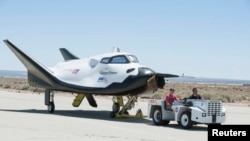NASA hired a third company to fly cargo to the International Space Station, adding an innovative space plane built by Sierra Nevada Corp to the commercial fleet, the U.S. space agency said Thursday.
Privately owned Sierra Nevada will join incumbents Space Exploration Technologies, or SpaceX, and Orbital ATK in ferrying supplies to the space station beginning in late 2019, the National Aeronautics and Space Administration said.
Terms of the contracts were not disclosed, though the overall value of the three awards is capped at $14 billion. Each company is guaranteed a minimum of six flights between 2019 and 2024.
NASA estimates it will need about four cargo runs per year, but expects to spend "significantly" less than $14 billion overall, station program manager Kirk Shireman told reporters on a conference call.
"Price was very, very important in terms of selecting these three companies, but they are so diverse in their capabilities," Shireman said.
Adding Sierra Nevada's Dream Chaser space plane, which lands on conventional runways, to the fleet opens new opportunities for biological and other research, said station chief scientist Julie Robinson.
"There are a lot of reasons to use animal studies to look at things like balance and sensory motor effects [of microgravity], and those are going to change so rapidly on return that we need to have the animals back right away," she said.
To reach the space station, Dream Chaser will blast off aboard a United Launch Alliance Atlas 5 rocket from Florida and land like an airplane at the Kennedy Space Center, or another site, Sierra Nevada Vice President Mark Sirangelo said in an interview.
SpaceX's Dragon capsules currently splash down in the Pacific Ocean, though the company expects to be able to touch down on land as well.
Orbital's Cygnus capsules, which can launch on the company's Antares rocket from Virginia or an Atlas 5 from Florida, burn up as they fall through the atmosphere, giving NASA an opportunity to remove trash from the station.
Boeing and Lockheed-Martin, which are partners in United Launch Alliance, failed in individual bids to win space station cargo delivery contracts.
Shireman said launch accidents by Orbital and SpaceX factored in to NASA's decision to add a third company into the mix.





